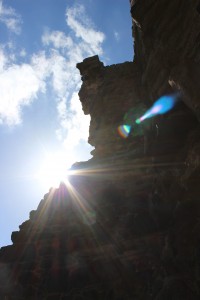At 1.51 Euro per liter, gas is $8.63 a gallon over here in Europe. Somehow, in spite of this, and in spite of the challenges presented by the Euro due to the crisis in Greece and other countries, the German economy is doing well. Economic growth, it appears, isn’t always tied to cheap oil.
How has this happened? In part it’s happened because the German government has seen the writing on the wall, the reality that black gold won’t pour from the ground forever, that reduced supply means a higher price. They, along with the rest of Europe, have also believed the overwhelming science that ties Co2 emmissions to greenhouse gases, and greenhouses gases to global warming. As a result, they’ve used the power of the centralized government to invest in rebuilding the energy infrastructure of the country, subsidizing and favoring alternative energy. This led to a 50% drop in the price of solar panels in Germany because so many people have participated – (something about higher volume leading to lower prices)
As a result of these and other policies related to resource use, Europeans use 10-15 acres of resource per person, depending on the country. The USA, in contrast, needs 24 acres per person, on average, to support our lifestyle. What do we get for those extra 14 acres?
1. We get addicted to a an economic model that demands we buy more stuff to keep the flames of commerce burning. This need to buy means we need cash, so now we’re releasing our strategic energy reserves to cheapen gas, in order to address the problem that people don’t shop enough stuff.
2. We get to lead the world in consumption of energy and the contribution to the greenhouse gas problem.
3. We get to rank #23 on the “happiness” scale, while countries like Colombia and Puerto Rico, Austria and Iceland, with much lower resource consumption made the top ten. Argue about the happiness scale if you like, but at least admit that once basic needs of food and shelter are met, happiness is tied to a host of other factors, most of which can’t be purchased in a store.
I’m visiting a country where public transportation, walking, and biking are all high priorities; so is building an alternative energy infrastructure. Germany, and the rest of Europe have their share of problems: immigration challenges much deeper than ours, economic inequities in the EU, and more. But they’ve managed to see the writing on the wall when it comes to C02 emissions and the end of easy oil.
They’re making hard choices – taxing “old” energy sources in order to subsidize new ones. The US? We’re releasing our strategic oil reserves to cheapen gas so that people will go shopping. Release the reserves if you must. Raise the debt ceiling if you must. But please: make a plan! Releasing these reserves without addressing either a long term energy plan or a long term economic recovery strategy is like refinancing your house to pay the utility bill; it relieves the pain for minute, but the mess that got you there remains.











